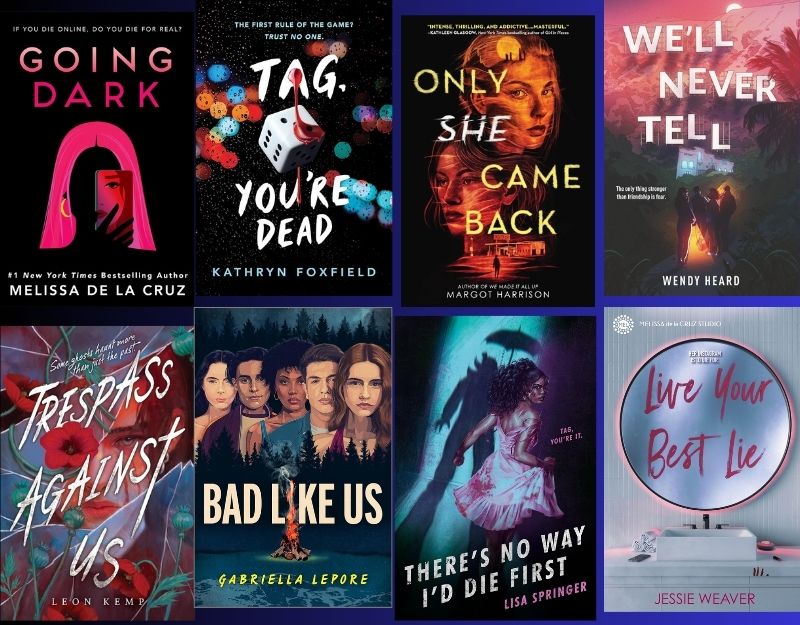Let’s Talk about MOXIE by Jennifer Mathieu
 Trigger Warning: Sexual Violence
Trigger Warning: Sexual Violence
This past year was a rough one for The Teen. I got repeated texts from my daughter asking me to please come pick her up at school because she didn’t feel safe. She came home and talked about boys touching her and her friends in the hallways, catcalling, asking them to send naked pics and telling them to suck their d*cks. As a mother and a sexual abuse survivor, it was so hard to watch my daughter go through this year.
During the last few weeks of school 15 girls were sent home for wearing school spirit t-shirts as opposed to the uniform polo shirts. Fifteen. But during an assembly where they were being taught CPR nothing happened to the boys who yelled out to the instructor crude comments about sucking and blowing. Absolutely nothing.
ADVERTISEMENT
ADVERTISEMENT
I called the school. I wrote to the admin. I asked them to address their sexual abuse policy and how it was being implemented. I shared with them stories about what was happening to my daughter and her friends.
And in the midst of all of this, I read Moxie.
Moxie is the story of a high school where the girls are going exactly through what my daughter was going through. This book was personal. So I after I read the book, I ran into The Teen’s room and said, “you need to read this right now.”
In Moxie, our main character, Vivian, begins a revolution to call out and raise awareness of harassment and injustice the girls in her high school face. It begins when she finds some old zines in her mother’s closet. She posts her own zine and asks her fellow students to show up on a specified date with stars on their hands to raise awareness. And several do. Over time, the movement evolves. Others post their own zines. Many of the girls hold a bake sale to raise funds for new uniforms for a female sport that isn’t supported in the same way that the HS football team is. When the bake sale is banned on campus, they hold an event off campus. They go from supporting one female sport to all female sports. Their advocacy is a work in progress as they learn, grown, regroup and figure out what it means to be involved and an advocate. I found this process to be incredibly realistic, that is the nature of waking up to injustice and choosing to be vocal. No one is a perfect advocate, ally or activist; we are all learning as we go. So of course these teenage girls are imperfect in their attempts. In fact, I appreciated the way the girls talked and worked out the kinks as they went along in their journey. Character growth is an awesome thing.
In a recent review by Kirkus, there were some harsh criticisms leveled again Moxie and the way these girls approach speaking out about their experiences. The reviewer complained that boys weren’t given a voice and that the book didn’t really address the issue of due process vs. vigilante justice. I disagree with this review.
Kirkus Quote: Vivian’s incensed reaction when her boyfriend suggests the anonymous accuser might be lying ignores the American judicial system’s core tenet of due process.
For one, Vivian has a boyfriend with whom she has many important conversations about these issues, including that of believing the victim. In fact, they have a very good discussion when one of the football players is accused of rape regarding false accusations and the important of believing the victim. It’s also important for us to note that false accusations are incredibly rare, in large part because of the harsh realities that victims must face when they do come out and share their story. We as a culture are quick to blame victims while even convicted offenders like Brock Turner will receive very little jail time as we are more worried about what happens to men who rape as compared to what happens to the girls that they rape. Vivian’s message is believe the victim, and that’s an important message. Victims are re-harmed time and time again because no one will believe them.
Kirkus Quote: But there are troubling moments when Vivian excludes willing male participants, seemingly suggesting that achieving female empowerment requires gender separation.
First, I’m not sure I view this quote as entirely accurate. For example, towards the end of the book, I felt that the girls were in fact thankful for the guy’s who participated in their walk out. As for the criticism that this book doesn’t embrace the activism of feminist men, I reply with this thought: why can’t a book about female empowerment be a book about female empowerment? One of the things I am learning as an ally is that my voice should never rise above that of the group or persons I am trying to be an ally for. In the work of feminism, this is true of the male voice. I appreciate the allyship and support of men when it comes to fighting for equal rights and sexual safety, but the male voice should not be louder than the female voice in this discussion because then nothing about the dynamics have changed. We currently have an all male leadership working to make laws about women’s healthcare and reproductive choices and male senators keep telling female senators to be quiet and sit down – now is the time to raise and amplify the female voice in the discussion of female rights and safety. Men do not lack a platform or a voice, so just this once maybe we can agree to empower our daughters and give them a voice and let men take a back seat. Is that too much to ask? I don’t think it is. I think it is the only way that the dynamics will change. It’s time to listen to women when we talk about women’s rights and bodies and experiences. This is a book that amplifies the female voice in the discussion of female experiences of oppression and sexual violence.
Kirkus Review: Further, the novel fails to educate readers that qualified police investigators, not school officials, must be alerted in accusations of criminal behaviors.
This quote is of particular interest to me because this what not actually the experience of some of the girls and their parents at our school this year. In fact, when a teen girl was held down in class as a boy tried to touch her and another boy tried to video tape it, her mother called the police to report the incident. She was told it was a school and not a police matter. Schools are required by Title IX to protect all students, including to protect them in instances of sexual violence. Unfortunately, schools are failing our students in this regard every single day. 1 in 4 of our daughters will be the victim of some type of sexual violence before they graduate high school. Much of this will take place in our schools. In fact, the police, schools and the judicial system keep failing them. There are far more guilty Brock Turners who will serve zero to little time after being found guilty.
As the mother of a teenage daughter who went through the exact experiences shown is this book, I feel Moxie is a powerful and important and relevant and inspiring story of how girls can join together to fight for their rights and safety. It’s a novel, not a hand book, but it’s definitely an inspiring starting point that says to girls, you can change the dynamics. What a powerful message that is to receive when you live in a world where you don’t feel safe at your school.
There are other powerful messages and discussions in this book. The characters change their minds about a lot of things as they learn and grow. They come to regard each other differently as they see each other as complex and dynamic people. There is, in fact, a powerful story about a cheerleader and how their stereotypical views of this person change when they receive new information.
ADVERTISEMENT
ADVERTISEMENT
I loved this book. It is the book that my teenage daughter and I needed in the midst of this school year. And I know, because I have worked with teens for 23+ years, that her experience was not unique. The first time a boy ever reached out and grabbed my breast was when I was walking through the hallways of my middle school. It was not the only time. Go ask any woman and they will probably be able to share similar stories as the stories that you read about in Moxie. And that’s why this book matters.
I highly recommend it. I’m buying it for every teenager I know.
Publisher’s Book Description
An unlikely teenager starts a feminist revolution at a small-town Texan high school in the new novel from Jennifer Matheiu, author of The Truth About Alice.
MOXIE GIRLS FIGHT BACK!
Vivian Carter is fed up. Fed up with a school administration at her small-town Texas high school that thinks the football team can do no wrong. Fed up with sexist dress codes, hallway harassment, and gross comments from guys during class. But most of all, Viv Carter is fed up with always following the rules.
Viv’s mom was a tough-as-nails, punk rock Riot Grrrl in the ’90s, and now Viv takes a page from her mother’s past and creates a feminist zine that she distributes anonymously to her classmates. She’s just blowing off steam, but other girls respond. As Viv forges friendships with other young women across the divides of cliques and popularity rankings, she realizes that what she has started is nothing short of a girl revolution.
Moxie is a book about high school life that will make you wanna riot!
This book comes out in September 2017
Filed under: #SVYALit, #SVYALit Project
About Karen Jensen, MLS
Karen Jensen has been a Teen Services Librarian for almost 32 years. She created TLT in 2011 and is the co-editor of The Whole Library Handbook: Teen Services with Heather Booth (ALA Editions, 2014).
ADVERTISEMENT
ADVERTISEMENT
SLJ Blog Network
Now on The Yarn: Colby’s Alaskan Children’s Book Adventure
Publisher Preview: Transit Editions (Winter 2025/26)
Exclusive: Archie Unveils New Graphic Novel Slate for Fall 2025 | News
When Book Bans are a Form of Discrimination, What is the Path to Justice?
ADVERTISEMENT








FYI to Kirkus, I’m an adult (teacher of 25 years) at a high school. I was stalked, threatened, and sexually harassed BY A STUDENT and the local police referred me back to the district.
Apart from the apparent considerable merits of MOXIE, we need to be intellectually honest. It is false news to say that false rape allegations are” incredibly rare.” Coincidentally but pointedly, the estimated percentage of false rape accusations is about the same as the estimated percentage of gay people in the population, between 2 and 10 percent. Lisak et al. (2010) investigated 10 years of statistics at one university to come up with that percentage, and then assessed it against other research, for the journal Violence Against Women. That article may be downloaded for free, here.
https://icdv.idaho.gov/conference/handouts/False-Allegations.pdf
We would never say that gay people are incredibly rare, and we should not say that false rape accusations are incredibly rare. Such accusations are shattering to everyone, including those women who have truly been victimized. That is why properly trained law enforcement should be the only people to investigate rape allegations, not ad hoc school councils, and why false allegations should be treated as a serious crime.